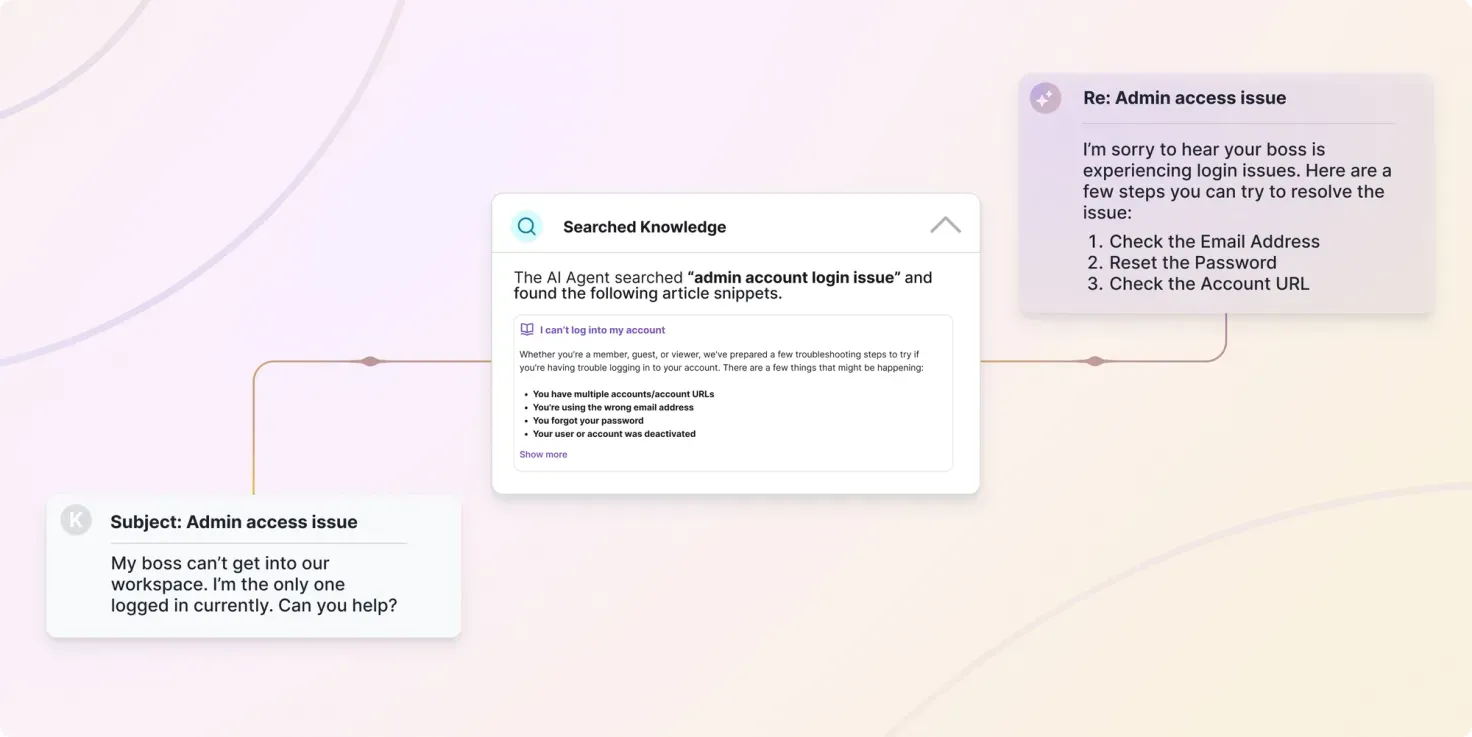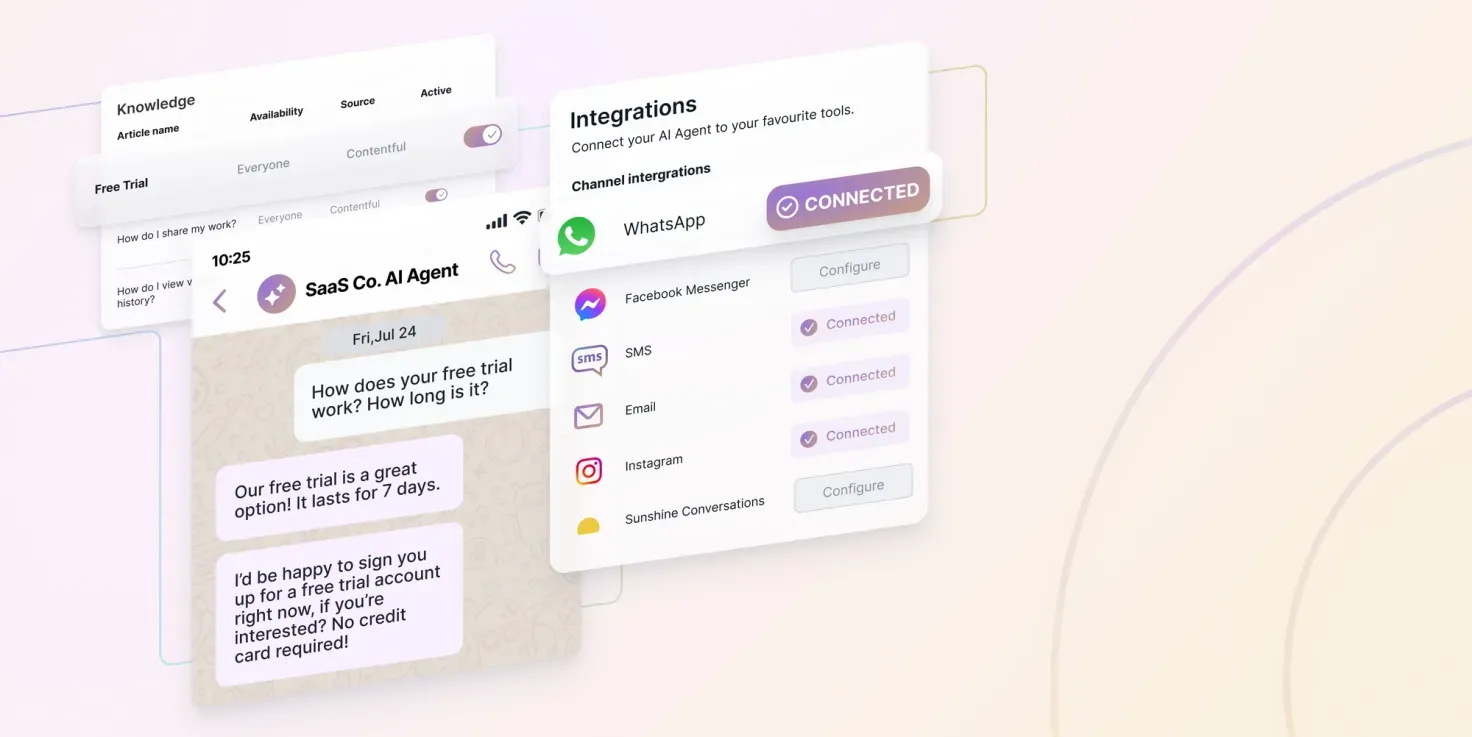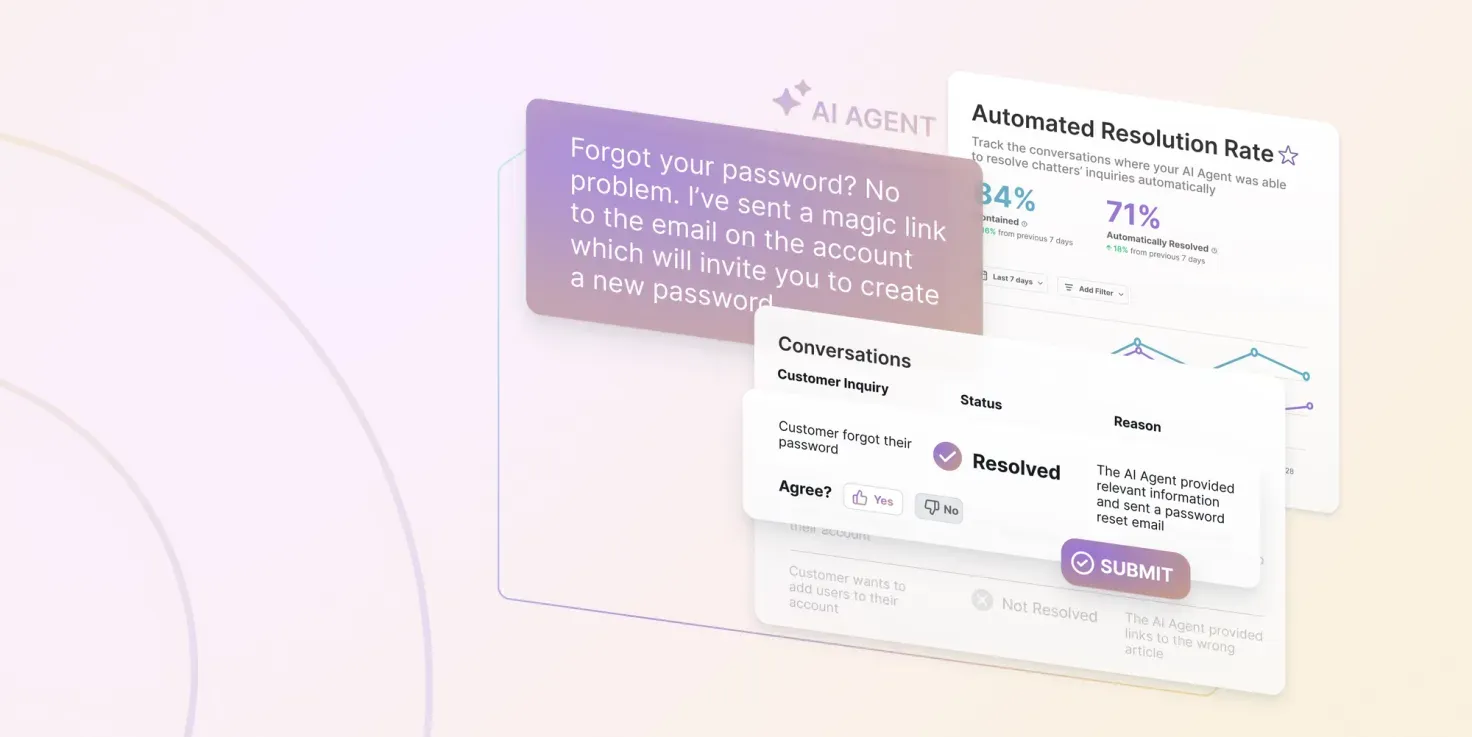
Guide to building vs. buying an AI Agent for customer service
This guide will help you assess the build vs buy question from 5 main angles so you can make a confident, informed decision.
Learn More

Chatbots have become the poster child for automation in customer service , promising 24/7 support and instant responses. But let’s face it, chatbots don’t always deliver on their promises.
The limitations of traditional chatbots are well-known at this point: rigid scripts, the inability to handle complex issues, and often, frustrating user experiences. But dismissing automation based on these early implementations would be like judging the potential of automobiles based on the Model T.
Automation in customer service has evolved far beyond simple question-and-answer bots. We’re entering a new era in customer service automation — one where AI acts as a force multiplier to enhance customer service.
AI is doing this in the expected ways, with more human-like interactions and higher resolution rates. But we’re learning that the true advantage of AI in customer service lies in its ability to reshape entire support ecosystems.
This paradigm shift is particularly significant for SaaS companies, where the quality of customer support can be a key differentiator in a crowded market. Let’s explore the ways AI is impacting the entire customer service ecosystem, for SaaS and beyond.
The days of static, outdated FAQs are numbered. AI is giving those dusty old resources a major upgrade.
An AI knowledge base is a dynamic, self-updating knowledge base that evolves with your product and customer needs. It doesn't just store information; it actively learns from every customer interaction, support ticket, and product update. By analyzing patterns in customer queries and support resolutions, AI can identify gaps in the knowledge base and even generate new content to fill these gaps.

But the real magic happens in how this information is served to users. AI-driven search and recommendation engines can understand the context of a user's query, even if it's phrased in an unexpected way. They can infer intent, account for common misspellings or industry jargon, and provide hyper-relevant answers.
For SaaS companies, this means customers can find solutions faster, reducing support ticket volume and improving overall satisfaction. It's like having a team of expert librarians working 24/7 to ensure every customer finds exactly what they need, when they need it.
When it comes to customer support, not all tickets are created equal. Some require urgent attention, others need specialized expertise, and some can be easily resolved with automated responses. AI is revolutionizing how support teams manage this complex triage process.
By analyzing factors such as the content of the ticket, the customer's history, the urgency of the issue, and the current workload of support agents, AI can make intelligent decisions about how to route and prioritize each incoming request. This ensures that critical issues are addressed promptly, and if a human agent is needed, each ticket is matched with the one best equipped to handle it.
For SaaS companies, where customer issues can range from simple "how-to" questions to complex technical problems, this intelligent routing can significantly improve resolution times and customer satisfaction. It allows support teams to operate more efficiently, focusing human expertise where it's most needed.
If expert predictions are right, 40% of customer service organizations will become profit centers by becoming de facto leaders in digital customer engagement. Intelligent routing and prioritization will play a crucial role in this transformation, enabling support teams to handle higher volumes of requests without compromising on quality.
Maintaining consistent, high-quality support across all channels and interactions is a significant challenge, especially for rapidly growing SaaS companies. AI is addressing this challenge by providing omnichannel customer service with built-in quality assurance.
AI agents can analyze 100% of customer interactions across all channels – something that would be impossible to do manually at scale. These systems can flag potential issues, identify best practices, and provide actionable insights for improving support quality.

For example, the AI agent might notice that certain phrases or approaches consistently lead to higher customer satisfaction scores. It might detect an answer that is consistently receiving negative feedback and suggest changes to the knowledge provided. This data-driven feedback loop enables support teams to continuously improve their performance.
One size fits all? Not in the world of SaaS customer service, where customer success is closely tied to product adoption and usage.
An AI agent effortlessly analyzes user data and behavior patterns and tailors these insights into a customer service experience unique to each individual user. For SaaS, this may include things like:

This enables highly personalized customer journeys — curating help resources and experiences based on individual user profiles and behavior. This definitely comes in handy for SaaS users, particularly when it comes to providing tiered support. You can give an AI agent instructions to treat different customer tiers with varied levels of personalized support — from newly onboarded users, to VIP power users of your platform.
An AI agent can also ensure customers have instant access to convert their accounts from “freemium” to paid the exact moment they’re ready to make the switch. From there, product adoption is seamless, with user guides and how-tos at their fingertips — delivered directly from the AI agent.
While much of the focus on AI in customer service has been on text-based interactions, phone support isn’t dead — it’s getting a high-tech makeover.
AI is making significant strides in enhancing the quality and efficiency of phone support. Using voice analytics, an AI agent can analyze customer calls in real-time, detect emotions, identify key topics, and even predict customer satisfaction. This technology can provide real-time feedback, suggesting responses or escalation paths based on the customer's tone and the content of the conversation. It’s like a built-in emotional intelligence booster.
For SaaS companies, this can be particularly valuable when dealing with technical issues or when walking customers through complex processes. The AI agent can pull in the relevant technical information or identify areas in the knowledge that could lead to potential misunderstandings.
Let’s say a customer calls the support line, frustrated with a workflow automation feature they're trying to set up. The AI agent immediately begins analyzing the customer's voice for emotional cues.
The system detects heightened stress and frustration in the customer's voice, indicated by an elevated pitch and faster speech rate. This information is logged and used to prioritize the call.
As the customer explains the issue, the AI transcribes the conversation in real-time and identifies key technical terms related to the workflow automation feature. Based on the emotional state and technical keywords, the AI determines that this is a high-priority call requiring detailed technical assistance.
The AI pulls relevant documentation and troubleshooting guides from the company's knowledge base, specifically related to workflow automation setup.
For SaaS companies, embracing AI-powered innovations isn't just about keeping up with trends – it's about creating a significant competitive advantage. In a market where customer experience is increasingly the key differentiator, AI-powered support can be the secret weapon that sets your company apart.
The future of customer service is not about AI vs humans, but about AI augmenting and enhancing human capabilities. It's about creating a symbiotic relationship where AI handles the routine, the repetitive, and the data-intensive tasks, freeing human agents to focus on what they do best: providing empathy, handling complex issues, and building relationships.
As we move forward, the companies that will thrive are those that can seamlessly blend AI capabilities with human touch, creating customer experiences that are efficient, personalized, and genuinely appreciated. The AI revolution in customer service is here, and it's transforming not just how we support customers, but how we understand and relate to them.
Find out how AI agents can unlock better customer experiences and ladder up to your business goals.
Get the guide